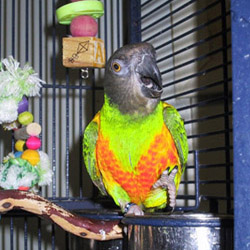 In the wild, a bird gets to choose when and where to perch, sleep and forage and they always choose locations where they feel safe and secure. Parrots are prey animals and instinctually on alert for predators at all times. A caged bird doesn't have the opportunity to decide most of this and, when they are scared, they don't have a flight option. Your parrot companion should feel secure and safe in its home and the choice of location for their cage is important for your parrot’s overall mental health.
In the wild, a bird gets to choose when and where to perch, sleep and forage and they always choose locations where they feel safe and secure. Parrots are prey animals and instinctually on alert for predators at all times. A caged bird doesn't have the opportunity to decide most of this and, when they are scared, they don't have a flight option. Your parrot companion should feel secure and safe in its home and the choice of location for their cage is important for your parrot’s overall mental health.
Parrots are flock birds and in your home, their cage should be placed in an area where they can interact with you, their flock, on a regular basis.
In order to help your bird have a greater sense of security, as well as a sense of belonging to the flock, the following factors should be considered when deciding where to place your bird's cage:
- Avoid placement directly in front of windows or in busy hallways where they could be startled by sudden movement.
- Place their cage so they can easily observe people and other family pets entering their room.
- At least one side of the cage should be against a wall or in a corner to enhance their sense of protection.
- Placement of the cage with a nearby view of a window may provide a source of entertainment and stimulation to your bird. This will give them an opportunity to observe the ever changing weather, wind in the trees, outdoor birds and neighbors and experience daylight cycles. With careful placement, you can deliver the "outdoor experience" to your parrot within the safety of the indoors.
- Don't place a cage near an outside door or window where they may be subject to rapid temperature changes or possibly escape during a moment of inattention.
- Birds need to have dark and quiet place to sleep (10-12 hours) and therefore their cage should be in a room where they aren't subject to late night activity.
- Cage placement in kitchens is not recommended due to the potential for exposure to toxic fumes and smoke as well as other hazards.



















































































































































Comments powered by CComment